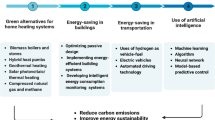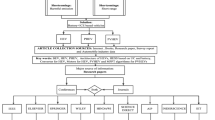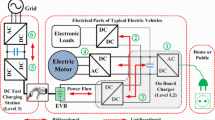Abstract
Battery-swapping is a mechanism that involves exchanging discharged batteries for charged ones. Battery-swapping and charging stations (BSCS) enhance operational flexibility and interact with electric vehicle (EVs) batteries. An optimal battery-swapping mechanism is proposed for electric vehicles using a hybrid approach. The proposed intelligent method is a wrapper of the radial basis function neural network (RBFNN) and the war strategy optimization (WSO) algorithm. Hence, it is known as the WSO-RBFNN method. The key objectives of the proposed method are to reduce the total cost by defining an enhanced charging schedule for EV batteries, the number of batteries pulled from inventory to fulfill all incoming EV swap orders, the risk of charging damage while using high-rate chargers, and the cost of electricity at various times of the day. The proposed method minimizes the net costs based on EV energy consumption and travel time. WSO is exploited to attain the optimum control parameters of RBFNN. The performance of the proposed method is measured in MATLAB and compared with existing methods. The simulation outcome shows that the proposed method-related cost is lower than the existing methods. The proposed method provides a low cost of 32.5 $ and a high efficiency of 90% compared with existing methods like differential evolution (DE), genetic algorithm (GA), and particle swarm optimization (PSO).




























Similar content being viewed by others
Abbreviations
- ACB:
-
Awaited charged battery
- GHG:
-
Greenhouse gas
- AGE-HN:
-
Adaptive-genetic-algorithms combining hill-climbing and neighborhood search
- MIIT:
-
Ministry of Industry and Information Technology
- BSCS:
-
Battery-swapping and charging stations
- NHTSA:
-
National Highway Traffic Safety Administration
- DE:
-
Differential evolution
- PSO:
-
Particle swarm optimization
- DN :
-
Distribution network
- RBFNN:
-
Radial basis function neural network
- DOE:
-
Department of energy
- RESs:
-
Renewable energy sources
- EFVs:
-
Electric freight vehicles
- SOC:
-
State-of-charge
- EPA:
-
Environmental Protection Agency
- SOH :
-
State of health
- EV:
-
Electric vehicle
- TOU:
-
Time-of-use
- FCBs:
-
Fully charged batteries
- VRPs:
-
Vehicle routing problems
- FFVs:
-
Fossil fuel-based vehicles
- WSO:
-
War strategy optimization
- GA:
-
Genetic algorithm
References
Ayyarao TS, RamaKrishna NS, Elavarasan RM, Polumahanthi N, Rambabu M, Saini G, Khan B, Alatas B (2022) War strategy optimization algorithm: a new effective metaheuristic algorithm for global optimization. IEEE Access 10:25073–25105
Ban M, Zhang Z, Li C, Li Z, Liu Y (2021) Optimal scheduling for electric vehicle battery swapping-charging system based on nanogrids. Int J Electr Power Energy Syst 130:106967
Behnke M, Kirschstein T, Bierwirth C (2021) A column generation methodfor an emission-oriented vehicle routing problem on a multigraph. Eur J Oper Res 288(3):794–809
Devarul P (2019) Hybrid electric vehicle battery charging/swapping station. Swapping Station. https://doi.org/10.2139/ssrn.3402301
Dhas Bensam S, Maruthu Pandi P (2019) A hybrid MWOAL approach for fast and efficient maximum power point tracking in wind energy conversion systems. J Renew Sustain Energy 11(3):033302
Garcia-Guarin J, Infante W, Ma J, Alvarez D, Rivera S (2020) Optimal scheduling of smart microgrids considering electric vehicle battery swapping stations. Int J Electr Comput Eng 10(5):5093
Hu W, Yao W, Hu Y, Li H (2019) Collaborative optimization of distributed scheduling based on blockchain consensus mechanism considering battery-swap stations of electric vehicles. IEEE Access 7:137959–137967
Li J, Wang F, He Y (2020) Electric vehicle routing problem with battery swapping considering energy consumption and carbon emissions. Sustainability 12(24):10537
Liu H, Gao B, Liu Y (2019) Battery swap station location routing problem with capacitated electric vehicles and time windows. In: 2019 IEEE 6th international conference on industrial engineering and applications (ICIEA) pp 832–836. IEEE
Masmoudi MA, Hosny M, Demir E, Pesch E (2020) Hybrid adaptive large neighborhood search algorithm for the mixed fleet heterogeneous dial-a-ride problem. J Heuristics 26(1):83–118
Namani R, Subramaniam S, Samikannu S, Gurusamy M (2021) A simple control strategy and dynamic energy management for the operation of combined grid-connected and standalone solar photovoltaic applications. Journal of King Saud University-Eng Sci. 2021 Dec 27
Rajesh P, Shajin F (2020) A multi-objective hybrid algorithm for planning electrical distribution system. Eur J Electr Eng 22(4–5):224–509
Rajesh P, Kannan R, Vishnupriyan J, Rajani B (2022) Optimally detecting and classifying the transmission line fault in power system using hybrid technique. ISA Trans 130:253–264
Salkuti SR (2022) Emerging and advanced green energy technologies for sustainable and resilient future grid. Energies 15(18):6667
Salkuti SR (2023) Advanced technologies for energy storage and electric vehicles. Energies 16(5):2312
Sangeetha S, Balamurugan K, Suresh G (2023) Performance analysis of buck converter with fractional PID controller using hybrid technique. Robot Auton Syst 169:104515
Shajin FH, Rajesh P, Raja MR (2022) efficient VLSI architecture for fast motion estimation exploiting zero motion prejudgment technique and a new quadrant-based search algorithm in HEVC. Circ Syst Signal Process 130:1–24
Shalaby AA, Shaaban MF, Mokhtar M, Zeineldin HH, El-Saadany EF (2022) A dynamic optimal battery swapping mechanism for electric vehicles using an LSTM-based rolling horizon approach. IEEE Trans Intell Trans Syst 23(9):15218–15232
Shao S, Guo S, Qiu X (2017) A mobile battery swapping service for electric vehicles based on a battery swapping van. Energies 10(10):1667
Tiwari V, Dubey HM, Pandit M, Salkuti SR (2022) CHP-based economic emission dispatch of microgrid using Harris Hawks optimization. Fluids 7(7):248
Varatharajalu K, Manoharan M, Palanichamy TS, Subramani S (2023) Electric vehicle parameter identification and state of charge estimation of Li-ion batteries: Hybrid WSO-HDLNN method. ISA Trans. https://doi.org/10.1016/j.isatra.2023.07.029
Wang S, Yu L, Wu L, Dong Y, Wang H (2019a) An improved differential evolution algorithm for optimal location of battery swapping stations considering multi-type electric vehicle scale evolution. IEEE Access 7:73020–73035
Wang Y, Lai K, Chen F, Li Z, Hu C (2019b) Shadow price based co-ordination methods of microgrids and battery swapping stations. Appl Energy 253:113510
Wang L, Wang X, Yang W (2020) Optimal design of electric vehicle battery recycling network–From the perspective of electric vehicle manufacturers. Appl Energy 275:115328
Wang H, Ma H, Liu C, Wang W (2021) Optimal scheduling of electric vehicles charging in battery swapping station considering wind-photovoltaic accommodation. Electric Power Syst Res 199:107451
Wu H, Pang GK, Choy KL, Lam HY (2017a) A charging-scheme decision model for electric vehicle battery swapping station using varied population evolutionary algorithms. Appl Soft Comput 61:905–920
Wu H, Pang GK, Choy KL, Lam HY (2017b) An optimization model for electric vehicle battery charging at a battery swapping station. IEEE Trans Veh Technol 67(2):881–895
Yang X, Shao C, Zhuge C, Sun M, Wang P, Wang S (2021) Deploying battery swap stations for shared electric vehicles using trajectory data. Transp Res Part d Transp Environ 97:102943
You P, Pang JZ, Low SH (2020) Online station assignment for electric vehicle battery swapping. IEEE Trans Intell Transp Syst 23:3256–3267
Zhan W, Wang Z, Zhang L, Liu P, Cui D, Dorrell DG (2022) A review of siting, sizing, optimal scheduling, and cost-benefit analysis for battery swapping stations. Energy 258:124723
Zhang M, Li W, Yu SS, Wen K, Zhou C, Shi P (2021) A unified configurational optimization framework for battery swapping and charging stations considering electric vehicle uncertainty. Energy 218:119536
Zhou B, Zhao Z (2022) Multi-objective optimization of electric vehicle routing problem with battery swap and mixed time windows. Neural Comput Appl 34:1–24
Author information
Authors and Affiliations
Contributions
N. Madhanakkumar was involved in conceptualization methodology, and original draft preparation. M. Vijayaragavan, V. Krishnakumar and Kannan Palanisamy contributed to supervision.
Corresponding author
Ethics declarations
Competing interests
The authors declare no competing interests.
Additional information
Publisher's Note
Springer Nature remains neutral with regard to jurisdictional claims in published maps and institutional affiliations.
Rights and permissions
Springer Nature or its licensor (e.g. a society or other partner) holds exclusive rights to this article under a publishing agreement with the author(s) or other rightsholder(s); author self-archiving of the accepted manuscript version of this article is solely governed by the terms of such publishing agreement and applicable law.
About this article
Cite this article
Madhanakkumar, N., Vijayaragavan, M., Krishnakumar, V. et al. Optimal battery-swapping mechanism for electric vehicles using hybrid approach. Clean Techn Environ Policy 26, 351–365 (2024). https://doi.org/10.1007/s10098-023-02632-x
Received:
Accepted:
Published:
Issue Date:
DOI: https://doi.org/10.1007/s10098-023-02632-x




